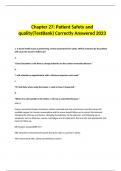quality(TestBank) Correctly Answered 2023
1. A home health nurse is performing a home assessment for safety. Which comment by the patient
will cause the nurse to follow up?
a.
"Every December is the time to change batteries on the carbon monoxide detector."
b.
"I will schedule an appointment with a chimney inspector next week."
c.
"If I feel dizzy when using the heater, I need to have it inspected."
d.
"When it is cold outside in the winter, I will use a nonvented furnace."
ANS: D
Using a nonvented heater introduces carbon monoxide into the environment and decreases the
available oxygen for human consumption and the nurse should follow up to correct this behavior.
Checking the chimney and heater, changing the batteries on the detector, and following up on
symptoms such as dizziness, nausea, and fatigue are all statements that are safe and appropriate and
need no follow-up.
DIF:Analyze (analysis)REF:374
OBJ: Describe environmental hazards that pose risks to a person's safety.
TOP: Assessment MSC: Safety and Infection Control
,2. The nurse is caring for an older-adult patient admitted with nausea, vomiting, and diarrhea due to
food poisoning. The nurse completes the health history. Which priority concern will require
collaboration with social services to address the patient's health care needs?
a.
The electricity was turned off 3 days ago.
b.
The water comes from the county water supply.
c.
A son and family recently moved into the home.
d.
This home is not furnished with a microwave oven.
ANS: A
Electricity is needed for refrigeration of food, and lack of electricity could have contributed to the
nausea, vomiting, and diarrhea due to food poisoning. This discussion about the patient's electrical
needs can be referred to social services. Foods that are inadequately prepared or stored or subject to
unsanitary conditions increase the patient's risk for infections and food poisoning, and an assessment
should include storage practices. The water supply, the increased number of individuals in the home,
and not having a microwave may or may not be concerns but do not pertain to the current health care
needs of this patient.
DIF:Analyze (analysis)REF:374 | 381 | 388
OBJ: Describe environmental hazards that pose risks to a person's safety.
TOP:PlanningMSC:Management of Care
3. The patient has been diagnosed with a respiratory illness and reports shortness of breath. The
nurse adjusts the temperature to facilitate the comfort of the patient. At which temperature range
will the nurse set the thermostat?
a.
60° to 64° F
b.
,65° to 75° F
c.
15° to 17° C
d.
25° to 28° C
ANS: B
A person's comfort zone is usually between 18.3° and 23.9° C (65° and 75° F). The other ranges are too
low or too high and do not reflect the average person's comfort zone.
DIF:Understand (comprehension)REF:374
OBJ: Describe environmental hazards that pose risks to a person's safety.
TOP: Implementation MSC: Basic Care and Comfort
4. A homeless adult patient presents to the emergency department. The nurse obtains the following
vital signs: temperature 94.8° F, blood pressure 106/56, apical pulse 58, and respiratory rate 12.
Which vital sign should the nurse address immediately?
a.
Respiratory rate
b.
Temperature
c.
Apical pulse
d.
Blood pressure
ANS: B
The temperature indicates the patient is experiencing hypothermia. Homeless individuals are more at
risk for hypothermia. While all the vital signs are low, the most critical vital sign at this time is the
, temperature.
DIF:Analyze (analysis)REF:374
OBJ: Describe environmental hazards that pose risks to a person's safety.
TOP: Assessment MSC: Reduction of Risk Potential
5. A nurse is teaching the patient and family about wound care. Which technique will the nurse teach
to best prevent transmission of pathogens?
a.
Wash hands
b.
Wash wound
c.
Wear gloves
d.
Wear eye protection
ANS: A
One of the most effective methods for limiting the transmission of pathogens is the medically aseptic
practice of hand hygiene. The most common means of transmission of pathogens is by the hands. While
washing the wound is needed, the best method to prevent transmission is hand hygiene. Wearing gloves
and possibly eye protection help protect the nurse, but handwashing is best for limiting the transmission
of pathogens.
DIF:Understand (comprehension)REF:375
OBJ: Discuss methods to reduce physical hazards and the transmission of pathogens.
TOP: Teaching/Learning MSC: Safety and Infection Control
6. The nurse is monitoring for Never Events. Which finding indicates the nurse will report a Never
Event?
a.


